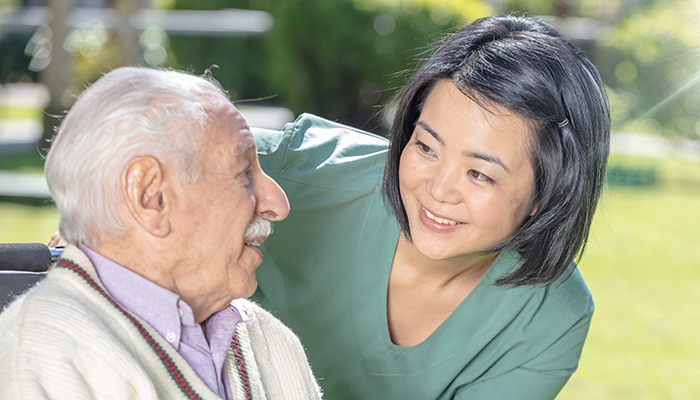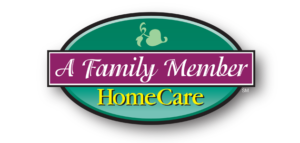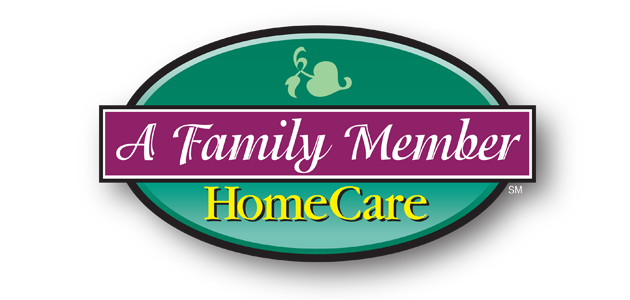Personal care, companionship, and homemaking

“Never underestimate the impact of a good caregiver! It’s not just knowing how to transfer a person from bed to chair or how to bathe a bedbound client. It’s the spark of connection that our caregivers bring—their warm hearts and positive attitudes—that serve as a lifeline, letting the client feel every day how important they are, and how loved. We don’t call it ‘A Family Member HomeCare’ for nothin’!”
—Brian Gauthier, gerontologist, owner of A Family Member HomeCare
Families call us for a variety of reasons:
- They live far away and need hands-on help caring for an elderly parent
- A hospital discharge requiring quick action to get home care in place
- Concern about a loved one staying safely at home (aging in place)
- Worry about loneliness and social isolation
- Dementia (memory loss, such as Alzheimer’s) that requires in-home caregivers for daily oversight
- Medically complex, high-acuity patients, when care needs are 24/7
- Extra support not provided by hospice
Does any of this sound familiar?
Give us a call at 1-866-Brian-XO (866-274-2696).
In-home care typically revolves around three types of care:
Personal care
Perhaps your relative needs help with more-intimate types of care. They may have a disabling condition or be in the late stage of dementia. Perhaps they are nearing the end of life and are unable to care for themselves. Many families turn to us when incontinence makes it too difficult for family members to provide care. Our caregivers are personal care experts:
- Bathing, dressing, and grooming
- Medication reminders
- Toileting and incontinence care
- Assisting with walking and transferring from bed to wheelchair
- Safety and fall prevention
Return to top
Companionship
It sounds easy and not very important—just a body in a room—but actually, companionship may be the most healing service of them all. It’s about quality of life.
Everyone needs to feel important, to feel heard and understood. Loneliness and social isolation are big issues for seniors. They directly lead to depression, drinking, and falls, as well as other health problems such as a rapid decline from dementia or a compromised immune system.
We pick our caregivers for their warmth and personality and then carefully match them to clients. We are looking for that chemistry that builds a strong and lasting relationship.
Our caregivers create those relationships because they understand the importance of human connection. A positive attitude and sparking conversation and curiosity is part of their professional tool kit. They are constantly looking for opportunities for mental and social stimulation, rapidly adapting to fit your loved one’s abilities.
For some clients, companionship might mean playing a game of cards. For others, it might mean coloring together in a coloring book. Your relative might prefer singing songs together. (It’s profoundly moving to see how much people in the advanced stages of dementia who no longer talk or communicate much, brighten up when they hear the songs of their youth.) Or they might enjoy looking at old photo albums and reminiscing. Our caregivers take time to discover the activities that bring out the spark in your loved one’s eyes, making each day the best day it can be.
Return to top
Homemaking
Sometimes all that’s needed is a little help around the house. Maybe the person you care for no longer drives. They need help running errands. Perhaps a spouse has recently passed and your loved one now needs help with cooking or laundry or other household tasks. Our in-home caregivers are there to provide the support that is needed, with heart and sensitivity.
- Meal preparation. Has your relative been prescribed a salt-free diet? Do they need the best foods for diabetes control? We can do that! But food is more than just nutrition. It’s our tie with our families of origin, our history. It brings up deep memories of love and belonging, of community and faith. Our caregivers work with you to learn simple recipes that are your loved one’s favorites. Do you keep a kosher kitchen? We have caregivers that are sensitive to the laws of kashrut—for example, keeping milk separate from meat.
- Grocery shopping and errands. To most of us this might seem a chore, but our caregivers make it an outing. If your loved one is able, we make it a fun excursion. Outside stimulation and engaging with others, even just sharing a joke with a checker, does wonders for the soul. It counteracts the loneliness and social isolation so common with seniors.
- Light housekeeping. We keep the home tidy and hygienic. The refrigerator is always cleared of old food. Walkways are kept clear. Heavy-duty housekeeping— deep cleaning—is reserved for professional cleaners.
- Laundry. Give the caregiver a quick tutorial on your preferences (cold water only, line drying, specific detergents) and they will make sure your loved one always has clean clothes in the closet.
- Transportation. For clients who no longer have a car but want to still get out and about, we supply a caregiver who has a car to help enhance quality of life. Perhaps your loved one needs a ride to the doctor’s office or to worship services. Many of our caregivers will drive their own car to get your relative where they want to go. They are licensed and insured.
- Assistance with light exercise and outdoor activity. Has the physical therapist recommended exercises? Our caregivers can provide reminders and assistance to help your relative regain their strength and stamina. Need someone to go for walks and be sure your loved one gets fresh air each day? Can do!
Return to top



